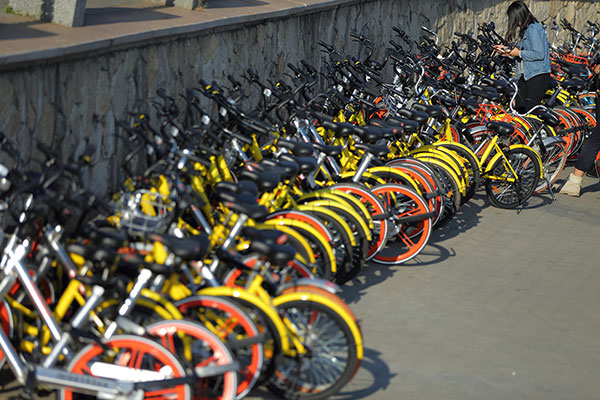Where to leave shared bike? Rules rolling into Shenzhen
 |
|
Bicycles of Mobike and Ofo, two major bike-sharing service providers in China, are parked outside a park in Shenzhen, Guangdong province.[Lai Li/For China Daily] |
China imposes some of the world's toughest driving restrictions for cars, and now the checks and controls are expanding to the bicycle-sharing industry.
Police in Shenzhen said over the weekend that they are considering restrictions on the use of shared bikes, especially during holidays, to prevent road congestion and public disorder.
Police said that about 520,000 bikes have been put on the streets in the city in the year since bike sharing began.
A growing number of people are taking the colorful two-wheelers to work or using them for recreation, which has brought some challenges. Over the Tomb Sweeping Day holiday earlier this month, for example, paths at a local park became seriously clogged with bikes, while careless parking of shared bikes often blocks traffic.
The police are partnering with bike-sharing companies to monitor the number of bikes in designated areas. Under the plan, if the accumulation of bikes in an area hits a certain number, a warning system will be activated that prohibits bikes from entering, with cyclists notified via a mobile app.
A limit on the number of bikes will be also enforced, along with temporary bans in certain public places during peak seasons.
Bike-sharing companies should be held responsible if their negligence leads to serious accidents, the police said. The companies have been ordered to report to police the number of bikes to be released in key areas before holidays.
The bicycle-sharing industry took off in China about two years ago when startups set out to use internet technology to transform the mobility sector.
A rider typically pays about 1 yuan ($0.15) an hour after unlocking a bicycle with a mobile app. The bike can be dropped off anywhere for the next user. Mobike, Bluegogo and Ofo are the major service providers.
According to analysis by a Beijing think tank, 18.86 million people in China used a shared bicycle at least once last year. The number is expected to hit 50 million this year, which will bring new headaches for urban management-including random parking.
On Tuesday, Shanghai's downtown Huangpu district banned the riding or parking of bicycles, whether private or rented, in five busy commercial areas, including the Bund and Nanjing Road Pedestrian Street. On another 22 roads-mostly popular commercial streets without bicycle lanes-bikes can be parked but not ridden, according to the district government.
Xinhua-China Daily





















